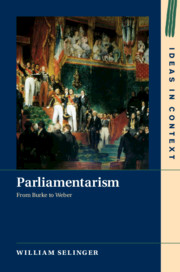Book contents
- Parliamentarism
- Ideas in Context
- Parliamentarism
- Copyright page
- Contents
- Acknowledgments
- Introduction
- Chapter 1 The Eighteenth-Century House of Commons
- Chapter 2 Edmund Burke’s Theory of Parliamentary Politics
- Chapter 3 The French Revolution and the Liberal Parliamentary Turn
- Chapter 4 Reinventing Parliamentarism: The Significance of Benjamin Constant
- Chapter 5 Democracy in America, Parliamentarism in France: Tocqueville’s Unconventional Parliamentary Liberalism
- Chapter 6 John Stuart Mill and the Victorian Theory of Parliament
- Conclusion
- Bibliography
- Index
- Ideas in Context
Chapter 6 - John Stuart Mill and the Victorian Theory of Parliament
Published online by Cambridge University Press: 05 July 2019
- Parliamentarism
- Ideas in Context
- Parliamentarism
- Copyright page
- Contents
- Acknowledgments
- Introduction
- Chapter 1 The Eighteenth-Century House of Commons
- Chapter 2 Edmund Burke’s Theory of Parliamentary Politics
- Chapter 3 The French Revolution and the Liberal Parliamentary Turn
- Chapter 4 Reinventing Parliamentarism: The Significance of Benjamin Constant
- Chapter 5 Democracy in America, Parliamentarism in France: Tocqueville’s Unconventional Parliamentary Liberalism
- Chapter 6 John Stuart Mill and the Victorian Theory of Parliament
- Conclusion
- Bibliography
- Index
- Ideas in Context
Summary
This chapter examines theories of parliament and parliamentarism in Victorian Britain. The first part of the chapter offers a general survey of Victorian constitutional theory. I demonstrate that while Constant’s conception of parliamentarism was defeated in France, it triumphed in Britain, where Victoria was widely viewed as a monarch who reigned but did not govern, and a range of authors argued that ministers must hold power through persuasion rather than patronage. I then consider Walter Bagehot, the most famous Victorian theorist of parliamentarism, who developed the argument that parliamentarism was intrinsically superior to the American constitutional model. Finally, I turn to John Stuart Mill. I demonstrate that Mill shared the widespread Victorian belief in parliamentarism, and I argue that his true project in Considerations on Representative Government was to discover a way to harmonize Victorian parliamentarism and electoral democracy.
Keywords
- Type
- Chapter
- Information
- ParliamentarismFrom Burke to Weber, pp. 164 - 193Publisher: Cambridge University PressPrint publication year: 2019

